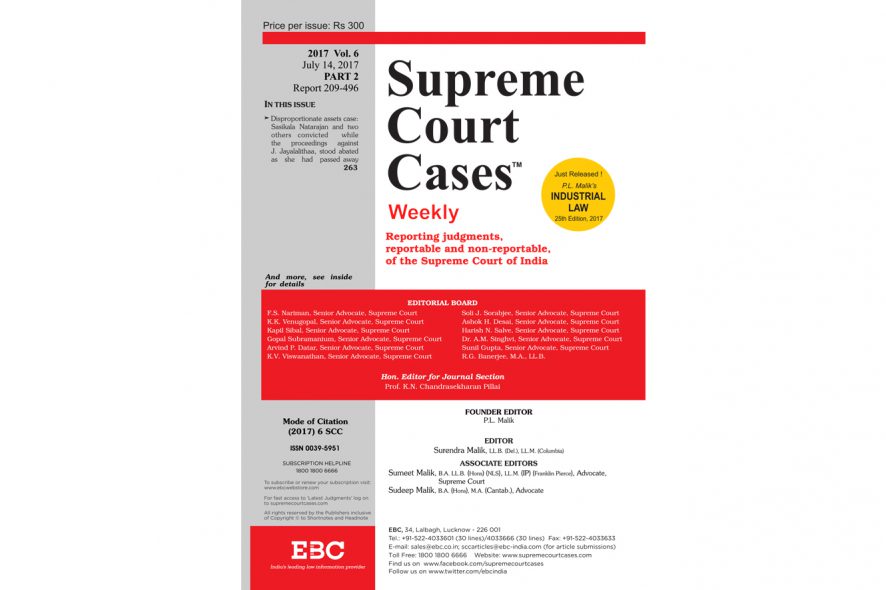SCC Issue dated February 28th, 2021 (Vol. 2 Part 1)
Read the significant judgment of the Supreme Court expertly analysed by our Editors in over 12 Short Notes. The Judgment held that with the change in the manner of publishing gazette notifications from analog to digital, the precise time when the gazette is published in the electronic mode assumes significance and hence, in the scheme of the Customs Act, 1962, the Customs Tariff Act 1975 and the Bill of Entry (Electronic Integrated Declaration and Paperless Processing) Regulations 2018, the time at which the notification under Section 8A is published would indeed have relevance.[Union of India v. G.S. Chatha Rice Mills, (2021) 2 SCC 209]
Short Notes: 12
Accounts, Accountants and Accountancy — Chartered Accountants: In this case, by impugned guidelines, Institute of Chartered Accountants of India (ICAI) introduced a cap on number of audit assignments that can be taken up by each Chartered Accountant throughout country. Writ petitions were pending in different High Courts involving a common question of law relating to validity of the said guidelines i.e. Ch. VI of Guidelines No. 1-CA(7)/02/2008 dt. 8-8-2008 issued by Council of ICAI on ground that same is violative of Art. 19(1)(g) of the Constitution. To settle the law and to clear uncertainty among tax professionals and citizens, it was held appropriate that Supreme Court may transfer writ petition, to authoritatively pronounce law on the subject. Transfer petitions were allowed and writ petitions pending in different High Courts withdrawn to Supreme Court. [ICAI v. Shaji Poulose, (2021) 2 SCC 203]
Companies Act, 2013 — Ss. 421(3) and 420(3) — Period of limitation — Commencement of — Inter-relationship between Ss. 420(3) and 421(3) and their invocation: Under S. 421(3) period of limitation starts from day on which certified copy is made available to the aggrieved party. S. 421(3) can be invoked when aggrieved person does not apply for certified copies instead waits for it as per S. 420(3) and R. 50 of the National Company Law Tribunal Rules, 2016. If aggrieved person applied for certified copies, then S. 421(3) cannot be invoked. [Sagufa Ahmed v. Upper Assam Plywood Products (P) Ltd., (2021) 2 SCC 317]
Consumer Protection Act, 1986 — S. 23 — Appeal to Supreme Court — Maintainability: Execution proceedings and Original proceedings, held, are separate and independent. Appeal under S. 23 of the CP Act will not lie to Supreme Court against an order which has been passed in the course of execution proceedings. Appeal under S. 23 is maintainable against an order which has been passed by NCDRC on a complaint where value of goods or services and compensation, if any, claimed, exceeds threshold which is prescribed. Hence appeal under S. 23 of the CP Act against order in execution dismissed as being non-maintainable. [Ambience Infrastructure (P) Ltd. v. Ambience Island Apartment Owners, (2021) 2 SCC 163]
Information Technology Act, 2000 — S. 8 — Notifications in e-gazettes — Exact time of e-publication — Significance of: S. 8 creates a legal basis for the publication of laws through e-gazettes. Thus, with the change in the manner of publishing gazette notifications from analog to digital, the precise time when the gazette is published in the electronic mode assumes significance. In this case, Noti. No. 5 of 2019 was uploaded in the e-gazette at a specific time and date, it could not apply to bills of entry which were presented on the customs automated EDI system prior to the time of uploading of the notification in the e-gazette. [Union of India v. G.S. Chatha Rice Mills, (2021) 2 SCC 209]
Motor Vehicles Act, 1988 — S. 168 — Compensation — Deduction towards personal expenses: Subsequent death of deceased’s dependant, ought not to be a reason for reduction of motor accident compensation. Claims and legal liabilities crystallise at time of accident itself, and changes post thereto ought not to ordinarily affect pending proceedings. [Kirti v. Oriental Insurance Co. Ltd., (2021) 2 SCC 166]
Service Law — Appointment — Excess appointments — Filling up of vacancies over and above number of advertised vacancies: Ordinarily appointments are to be made strictly in order of merit in terms of select list prepared by competent authority as contemplated under relevant statutory recruitment rules. Any appointment in contravention thereof would be in violation of Art. 14 of the Constitution. However, further held, any appointments made deviating from merit in exceptional cases can be justified, like in instant case viz. to give quietus to litigation. However held, such appointments would be irregular appointments, though not illegal. Hence, even if action of State in extending benefit of concession recorded vide Supreme Court order dt. 10-5-2007 was a mistake; similar benefit cannot be claimed by appellants which would perpetuate mistake. Negative equality cannot be claimed to perpetuate further illegality. [Pankjeshwar Sharma v. State of J&K, (2021) 2 SCC 188]
Service Law — Recruitment Process — Examination — Correctness of final key answers uploaded by State PSC — Scope of Judicial Review: Though re-evaluation can be directed if rules permit, but practice of re-evaluation and secreting of questions by courts which lack expertise in academic matters must be discouraged. It is not permissible for High Court to examine question papers and answer sheets itself, particularly when Commission had assessed inter se merit of candidates. Courts must show deference and consideration to recommendation of expert committee. [Vikesh Kumar Gupta v. State of Rajasthan, (2021) 2 SCC 309]







Thanks.. good articles are being uploaded.
Respected Sir,
Pl. added me on SCC on line blog